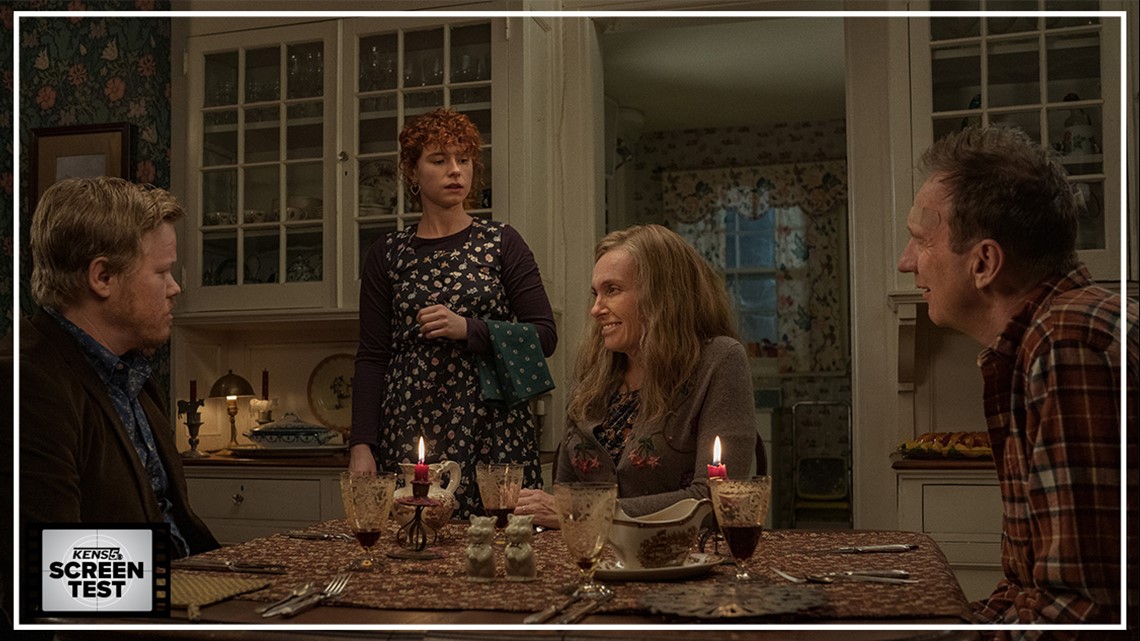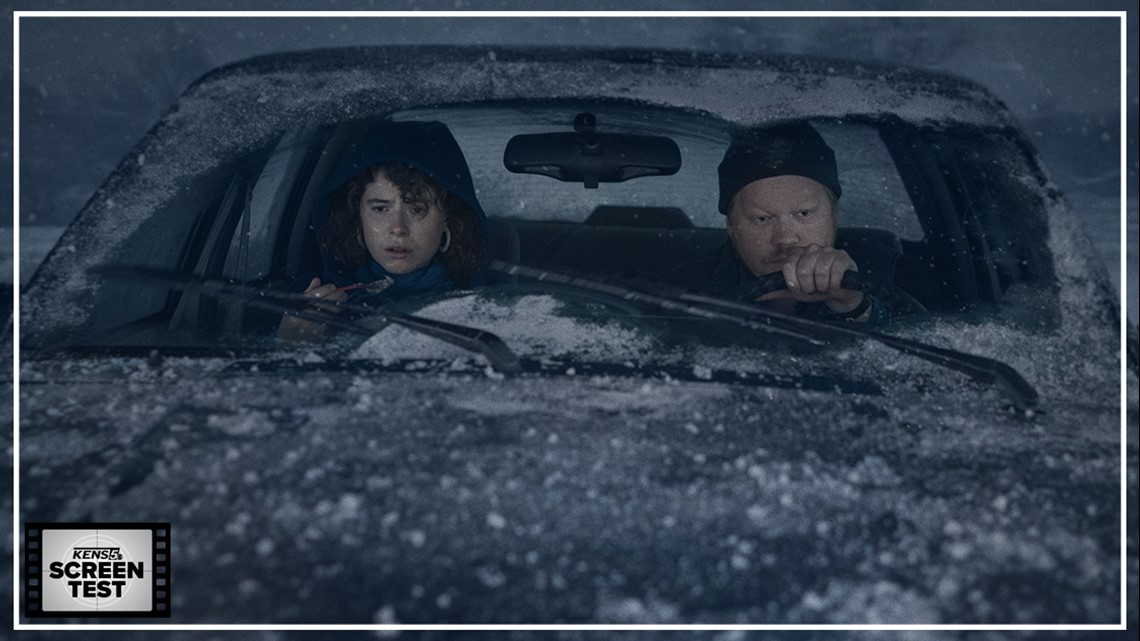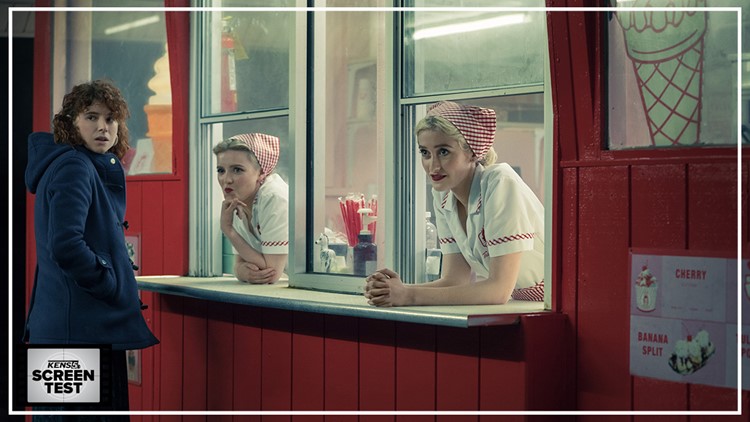“Other animals live in the present. Humans cannot, so they invented hope.”
Of all the philosophical utterances that lie in wait throughout the screenplay of Charlie Kaufman’s newest head trip, “I’m Thinking of Ending Things,” this is the one that has lodged itself deepest in my brain...or at least what remains after another bout with the filmmaker’s boundless imagination. Like an epiphany sprung from rusted springs, the line is delivered with quiet remorse by an American-accented Jessie Buckley at a point when things are just beginning to go from strange to confounding.
We’ve seen enough up to this point to think we know what to make of her suggestion, what with the obvious emotional asynchronicity clearly jeopardizing the connection between the young woman and her boyfriend, Jake (Jesse Plemmons) as they drive to the latter’s childhood home, their conversations akin to struggling to fit square-shaped blocks into round holes. But while Kaufman’s hinting at such a formless concept as hope as the result of practical human endeavor would surprise no one familiar with the man behind such hopelessly hopeful tales as “Synecdoche, New York,” “Eternal Sunshine of the Spotless Mind” and “Anomalisa,” the things that seem like thesis in “I’m Thinking of Ending Things” are – like life and love and intention –more often than not illusion. If we thought two decades of familiarity was enough to imagine we could be onto Kaufman, he proves us wrong. More thrillingly, he seems to be proving himself wrong as well—the mark of someone still wandering, curiously, in his craft.
The 61-year-old writer-director is one of cinema’s foremost working masters at literalizing the absurdities and agonies of the human experience, and so absurdity and agony are tangoing with each other from the earliest moments of “I’m Thinking of Ending Things,” which was adapted from Iain Reid’s 2016 novel of the same name and hits Netflix Friday. Images of an empty house – wallpaper, furniture, appliance, a cautious descent down stairs – bleed together as Buckley’s young female protagonist (we’ll call her Lucy, although her name is one of a million ambiguous things in the movie) ponders, yes, the endings of things, and the possibility of the endings of things by her hand. It may or may not be an original thought; Lucy isn’t certain. She speaks with the existential curiosity of a newborn…
....or someone still in the early days of a new relationship. With the melancholy twinkle of Jay Wadley’s score setting a lovely mood that will quickly shift, snow gently falls on a smiling Lucy as she waits for Jake – oh, but she’s still considering the endings of things, it’s a consideration she can’t let free from her mind’s grasp – and she momentarily glimpses a man watching from a window, his own thoughts briefly interjecting hers. Who is he? What’s that he was saying under his breath? His voice is like ambience. Jake pulls up, responds to her excitement about the weather with strained reciprocation. Whatever makes up this “strong and intense attachment” she insists she and Jake share, it seems, clearly, like hogwash. Does that make it a clue to deciphering this mesmerizing movie’s first minute? If so...who exactly is the clue for?
If it wasn’t clear by now, “I’m Thinking of Ending Things” is a movie that teases and tugs, that deepens its mysteries just when it seems to be lifting some of the fog. As Lucy and Jake drive through the snow toward her first meeting with his parents in the country, they communicate in that familiar kinda-cute, mostly awkward search for discussion to pass the time – what’s the research you’re working on? Are we going to be able to return if this snow worsens? Should we stop for coffee? – and we begin to pick up subtle clues of barely disguised tensions, of yes-Lucy-perhaps-you-should-most-definitely-be-ending-things...so long as those things are Jake-related things.
The film at first feels like a rumination on the feints and follies of interpersonal relationships. Makes sense; it’s Kaufman. In reality, that’s just a jumping-off point. Makes sense; it’s Kaufman! Under the cover of thick melancholy, even thicker déjà vu and growing suspicions that reality isn’t quite as it seems, “I’m Thinking of Ending Things” becomes another deviously crafted work from a director all too eager to draw us into his malleable embrace of the quandaries and contradictions that comes with merely being. Apologies to the uninitiated to Kaufman’s oeuvre, but the strangeness is just the truth of it. It’s the beauty of it too.
Part of Kaufman’s cinematic essence is in the repurposing of aesthetic tropes we recognize to create something entirely new, something typically equal parts hilarious and horrific. He unlocks something subliminal in the artful; two lovebirds jogging on a beach feels cataclysmic in “Eternal Sunshine,” while the mimicry of life in one’s art is an act of desperation in “Synecdoche.” The curveball with his latest movie is that the subliminal is in the open for all to see. If the tense car ride to Jake’s parents in “I’m Thinking of Ending Things” doesn’t convince you that the director is veering closer than he ever has before to simmering psychological horror (though this is less about outright scares than foundational uneasiness), this lonely setting of the farmhouse will. Snow that was previously at a gentle drift now rages to the wind, a precursor to looming instability. Jake takes Lucy to see the sheep, not paying much mind to her concerns about the dead lambs that lie nearby. Inside, the details of a gloomily lit home play on our expectations, and we wonder what boogymen await behind a basement door that appears to be taped shut and damaged. More urgently, we wonder about what Jake knows about what is behind the door.
Jake’s parents dial up our uncertainty, and the film’s sheer unpredictability. Played to a delightful eccentric tune by Toni Collette and David Thewlis, they occupy a whole other tier of implied suspicion. In between displaying off-kilter interest in Lucy, they wrestle with an increasingly flummoxed Jake (“It’s genus, Mom! Not genius!”), throwing our sympathies into further disarray. A quest for emotional validation unfolds, or, perhaps, has been unfolding. And Kaufman – returning that trademark habit of fiddling with the spatial and temporal logic of his worlds – begins forcing us to question our perspective, especially in regards to whatever subjectivity we thought we could entrust in the form of Lucy.


As more time is spent in the home, events and recollections and chronologies encroach on each other. Lucy walks into Jake’s childhood room and, judging from what she finds, we may as well be in his head. Pay attention to the things on the shelves (anyway, this is Netflix. Feel free to pause!). Jake’s father suddenly appears, visibly older and more frail. Is this a dream or something more consequential? Reality’s disintegration starts to steer Kaufman’s interests into devastating focus: Namely, that uniquely abstract (and uniquely human) compulsion to live in multiple spaces at once, to evaluate the proximity of things we touch, see, feel. How many times have we offered a first word to someone or taken a first step in some great endeavor and been able to restrain ourselves from jumping a decade down the line, and evaluating possibility at the risk of neglecting the present? The protagonist of H.G. Wells’s “The Time Machine” offered up how time is a fourth dimension to our physical being. I’m not sure how much Wells Kaufman has been reading lately, but “I’m Thinking of Ending Things” feels obsessed with the idea—with the possibility of hope in our future, or perhaps of finding it in our past.
As things grow even more surreal, Kaufman magnetizes our investment instead of repelling it. That’s a reliable part of his charm, though here he gives and takes more than he perhaps ever has. Hardly a minute goes by without a fleeting moment of surreality. No, you didn’t just imagine a billboard briefly speaking to our characters. Yes, those inexplicable sojourns to a B-plot involving a janitor going about his tedious day hold purpose. Absolutely, close attention should probably be paid to the odd sequence when Lucy seems to have been possessed by the spirit of Pauline Kael as she and Jake contemplate the merits of performance and intention in John Cassavetes’s “A Woman Under the Influence.” The 1974 film is just one of a bevy of cultural references to mine and form an interpretation. “I’m Thinking of Ending Things” is Kaufman playing around in his biggest sandbox, and while one can appreciate the sheer unpredictability on a surface level, there’s a unique satisfaction in trying to wrestle with it all—to figure how the obtuse aligns with the personal, via the fairly simple (and quietly devastating) premise of people on different emotional wavelengths.


It helps immensely that we have our two similarly named actors powering that nuance. As the closest thing the audience has to a proxy, Buckley puts in another remarkable turn in a movie that asks her to be both a stranger to the strangeness unfolding around Lucy and also seemingly an active agent within it. She gives perplexion an entire spectrum, both justifying our confusion at strange glitch-in-the-matrix moments and also sharpening the film’s themes to a fine edge that allows Kaufman to further puncture reality. Pay attention, meanwhile, to Plemons’s squirminess. Though “I’m Thinking of Ending Things” finds new depth to the unnerving menace that the actor utilized so frighteningly well as Todd in “Breaking Bad,” Jake seems to be searching just as much as Lucy is...though what he’s hoping to find may not be the same thing. Plemons has a rare presence, something uniquely and boyishly odd, and Kaufman weaponizes that here.
In true Kaufmanesque fashion, “I’m Thinking of Ending Things” is a things-that-go-bump-in-the-mind drama cut from the same tormented cloth as the filmmaker’s other works, and it’s something that carves its own fierce path. It’s companion piece, and it’s antithesis—a suitable contradiction for an artist who has examined themes as universal as anything the movies have seen this century. It’s also a film where Kaufman shows his hand before divulging what game he’s even playing at. That may sound loathsome; I’d encourage you to pull up a seat anyway. And don’t forget to make yourself comfortable. As with all things, it won’t last. But there’s something hopeful about imagining that they may, isn’t there?
"I'm Thinking of Ending Things" is rated R for language, including some sexual references. It's available to stream on Netflix starting Friday.
Starring: Jessie Buckley, Jesse Plemons, Toni Collette, David Thewlis
Directed by Charlie Kaufman
2020
OTHER SCREEN TEST REVIEWS:
- ‘Epicentro’ Review: A monumental and monumentally complex observation of Cuba at a crossroads
- ‘Centigrade’ Review: Wintry thriller feels as weary as its trapped victims
- ‘Tesla’ Review: Overlooked innovator gets the spotlight in alluringly unconventional biopic
- ‘Unhinged’ Review: Russell Crowe is on a rampage in brutal, thematically stagnant thriller
- ‘Boys State’ Review: Political maneuvering knows no (age) limits in enthralling new documentary
- ‘Sputnik’ Review: Spunky and smart creature feature makes for a tantalizing feature debut
- 'Canción Sin Nombre' Review: Haunting drama zeroes in on the no man's land of political revolution
- ‘She Dies Tomorrow’ Review: An unnerving study of primal reckoning
- 'Radioactive' Review: An actively frustrating biopic



